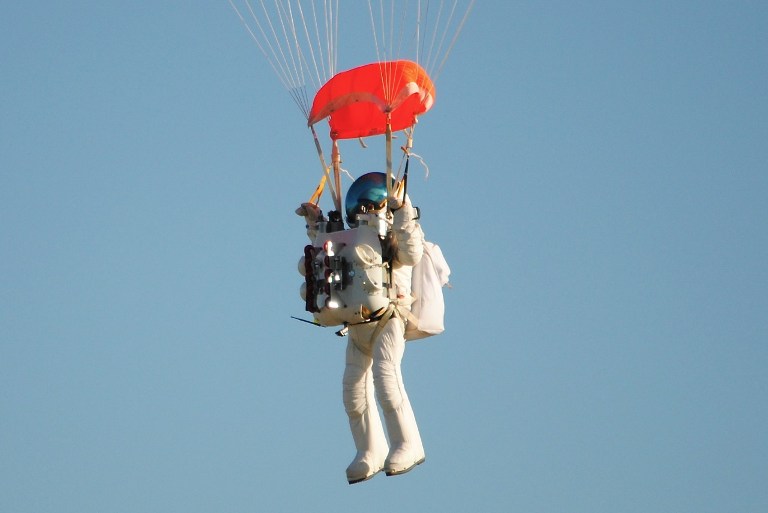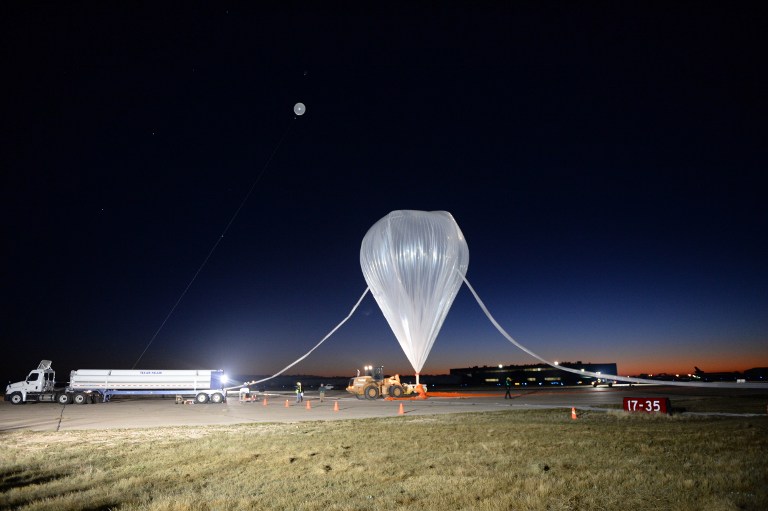Google exec makes record skydive from edge of space

Google executive Alan Eustace after a record-breaking 41,000-metre space dive, parachuting back to Earth in Roswell, New Mexico. (Photo: AFP/Paragon Space Development Corporation)
WASHINGTON: A Google executive set a new record on Friday (Oct 24) by jumping successfully from near the top of the stratosphere - some 135,000 feet, or 41,000 metres high, his project website said.
The record dive by 57-year-old Alan Eustace, who is a "senior vice president of knowledge" at Google, was conducted as part of the Stratospheric Explorer project to allow manned exploration of the stratosphere above 100,000 feet.
According to a statement from the Paragon Space Development Corporation, Eustace completed the four-hour mission over Roswell, New Mexico, using a specially designed space suit and balloon module to carry him to the stratosphere.
"Ascending at about 1,000 feet per minute, Alan achieved his target altitude in about two and a half hours," the statement said. "He spent a short time, around a half hour, experiencing the wonders of the stratosphere before being released from the balloon. In rapid free fall, Alan experienced a short period of near weightlessness and within 90 seconds exceeded the speed of sound."

The previous record was set by Austrian skydiver Felix Baumgartner in 2012, jumping from a height of nearly 128,000 feet or 38,969 metres, also from New Mexico.
Eustace's free-fall into the atmosphere lasted about five minutes, and he deployed his parachute at around 18,000 feet "and floated gently to the ground," the statement said. "Within four hours of launch, Alan arrived at the launch site where the team and guests toasted his achievement and safe return."
Paragon produced the recovery systems for the project, designed by the engineering firm ILC Dover with assistance from several other consultants and companies.
The New York Times, which first reported the news, quoted Eustace as saying: "It was amazing. It was beautiful. You could see the darkness of space and you could see the layers of atmosphere, which I had never seen before." The Times said that Eustace was propelled from the module with a small explosive charge, sending him travelling briefly at supersonic speeds, creating a sonic boom heard by observers on the ground.
According to Paragon, the system has wide-ranging applications for the study of the science of the stratosphere. These include the "development of means for spaceship crew egress, the study of dynamics of bodies at Mach 1, new high altitude aircraft suits, and setting of records for space diving, sailplaning and ballooning."
Without special equipment, humans cannot live at that altitude, according to Paragon, which says that "besides being unable to breath, exposure to the vacuum of space will cause fluids in the body to boil." The space suit is similar to those used for the Apollo missions and on the International Space Station, the company said.
The missions by Eustace and Baumgartner offer hope for rescue and evacuation from troubled spacecraft. The US space shuttle was fitted with a crew evacuation system after the 1986 Challenger disaster. The private firm World View Experience announced that it had obtained the rights to offer these dives for "near space" tourism and research. For US$75,000, adventurers can duplicate the experience.
"World View will have voyagers floating peacefully to the edge of space for a one-to-two-hour space cruise within a luxury capsule complete with bar and lavatory, which is transported by a parafoil and high-altitude balloon," the company said. "They can even share the experience in real-time with loved ones thanks to in-flight Internet access."
What the stars mean:
★ Poor ★ ★ Promising ★★★ Good ★★★★ Very good ★★★★★ Exceptional
Latest News
More News
- Vietjet launches mega year-end ticket promotion (December 10, 2025 | 11:33)
- Vietjet launches daily Manila flights to celebrate year-end festive peak season (December 05, 2025 | 13:47)
- Phu Tho emerges as northern Vietnam’s new tourism hub (December 01, 2025 | 17:00)
- Vietjet completes Airbus A320/A321 updates ahead of deadline (December 01, 2025 | 09:49)
- Vietjet resumes Con Dao flights from early December (November 28, 2025 | 15:24)
- Free tickets, Lunar New Year promotions on offer at Vietjet Mega Livestream (November 26, 2025 | 15:32)
- UNIQLO unveils upgraded heat-retention wear at Hanoi event (October 26, 2025 | 10:00)
- Vietnam named among world’s top four culinary destinations (October 24, 2025 | 17:09)
- Vietnam and Denmark strengthen dialogue on sustainable fashion (October 20, 2025 | 09:11)
- Fusion rolls out special initiatives to celebrate Vietnamese Women’s Day (October 17, 2025 | 20:00)
















 Mobile Version
Mobile Version